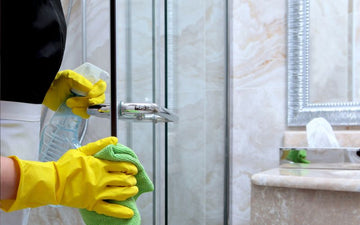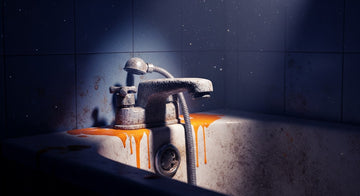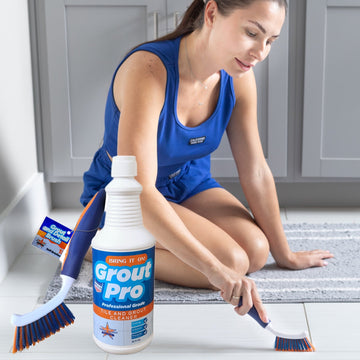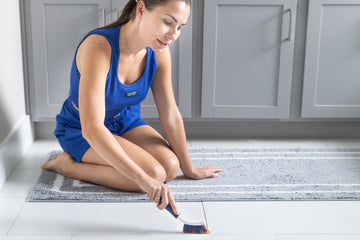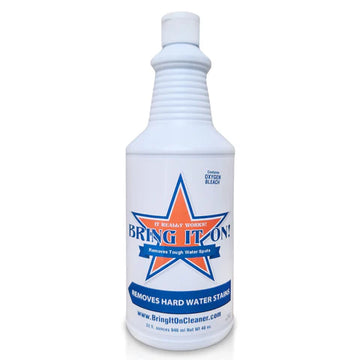So, you've finally invested in that stunning glass shower door. It's sleek, contemporary, and THE focal point of your bathroom. But as time marches on, you begin to notice water spots, limescale, and maybe even a bit of mildew. Suddenly, your elegant addition is not looking so glamorous after all. What if I told you it doesn’t have to be this way? Cleaning your glass shower door needn't be a Herculean task; think more like a quick sleight of hand with the right tools and techniques. In this blog post, we'll walk through the ultimate game plan for maintaining your glass shower doors' sparkle without stressing over stubborn grime or streaks. Our tips and tricks will turn what seems like an impossible chore into a satisfying routine. So roll up your sleeves - you're about to become the champion of glass shower door cleaning!
Our article "Glass Shower Door Cleaning: Tips and Tricks" provides various methods for cleaning and maintaining glass shower doors. Some of the top tips include using eco-friendly alternatives like distilled white vinegar or lemon juice, regularly squeegeeing the door after every shower, and preventing hard water spots by keeping the door open to dry. Following these steps can help keep your glass shower doors clean and prevent the need for deep cleaning.
Selecting Effective Cleaning Materials
When it comes to cleaning your glass shower door, selecting the right cleaning materials is crucial to achieving a sparkling finish without damaging the surface of the glass. With so many options available on the market, it can be overwhelming to choose which one to use.
For instance, some people opt for commercial cleaning products that are specifically formulated for removing hard water stains and soap scum, while others prefer natural cleaning agents like vinegar, baking soda, and lemon juice. Whichever product you choose, make sure it is safe for glass surfaces.
Some commercial cleaners contain harsh chemicals that can etch or scratch the glass if left on for too long or applied with abrasive pads. On the other hand, using natural cleaning agents may require more elbow grease but result in a cleaner end product. It's also important to keep in mind the cost and availability of these products.
Another option is microfiber cloths or foam sponges that work well at loosening dirt without scratching the surface of the glass. However, some people may find them less effective than traditional methods like a squeegee or scrub brush. Ultimately, it comes down to personal preference and what works best for your glass shower door.
In the following section, we'll explore one such natural cleaning agent- vinegar.
Vinegar & Water: A Cost-Effective Solution
Distilled white vinegar is a popular natural cleaning agent that is found in most households and is an effective solution for cleaning glass shower doors without damaging their surface.
The acidity of vinegar helps break down soap scum and hard water stains, making them easier to clean off. Additionally, vinegar is cheap and easy to find. Unlike harsh chemical cleaners which have strong fumes and irritate the skin or eyes, vinegar is a natural product that poses no threat to your health.
To use vinegar to clean your glass shower door, mix equal parts of distilled white vinegar and water in a spray bottle. Spray the solution onto the door and let it sit for 15-20 minutes before scrubbing it with a soft brush or microfiber cloth. Rinse the door thoroughly with water to remove any remaining residue.
Think of vinegar as a superhero in disguise that comes to your glass shower door's rescue! It is mild-mannered, non-toxic and all-natural - but when mixed with water, it becomes a powerful cleaning agent that can cut through even the toughest soap scum and hard-water stains.
However, some people may find the smell of vinegar unpleasant, which can be remedied by adding essential oils or lemon juice to the mixture. Additionally, vinegar is not recommended for use on surfaces such as marble or granite as it can etch or damage the surface.
Now that you have learned about effective cleaning materials and how to use vinegar as a natural cleaning agent, let us delve into the step-by-step guide on cleaning your glass shower door.Hide
Cloth Types: What Delivers the Best Results?
Selecting the right cloth to clean your glass shower door is crucial in achieving a sparkling finish. With various types of cloths available in the market, it can be overwhelming to know which one delivers the best results. Generally, microfiber cloths are highly recommended for cleaning glass surfaces due to their absorbency and non-abrasive nature.

Anecdotal evidence from cleaners suggests that they prefer using microfiber cloths as they do not leave streaks on the surface. A smooth and gentle texture can make all the difference, especially when working with delicate glass surfaces. Similarly, some homeowners attest that cotton towels work great for wiping down their glass doors, citing relative softness and effectiveness in cleaning stains.
However, it's essential to avoid using abrasive fabrics such as nylon or sisal scouring pads that can scratch or damage the glass surface. Abrasive materials may cause deep scratches that weaken the surface over time, making it more prone to chipping.
While some people prefer paper towels for convenience's sake, others argue that this could lead to excess waste challenges and cost in the long run. Besides, paper towels do not absorb moisture effectively compared to other reusable cloth types like microfiber or cotton-based fabrics.
So what are some of the best cloth options available for cleaning your glass shower door? Let's find out in the next section.
The Cleaning Process: Step-By-Step Guide
Cleaning a glass shower door requires multiple steps to achieve optimal results. Here is a detailed guide on how to clean your glass shower door effectively.

First, mix equal parts of white vinegar and water in a spray bottle and shake well before use. Spray the solution liberally on your glass shower door until it's thoroughly wet.
Next, grab a microfiber cloth and begin to scrub gently in circular motions, focusing on areas with hard water stains or mold growth.
Cleaning a glass shower door is similar to washing a car; you have to work the entire surface systematically to avoid missing any spots, especially the nooks and crannies where soap scum likes to accumulate.
After scrubbing the door, the next step is rinsing and drying the door using proper techniques.
- To effectively clean a glass shower door, it is important to follow multiple steps including using a white vinegar and water solution sprayed liberally on the door, gently scrubbing with a microfiber cloth in circular motions, working systematically to avoid missing any spots, and rinsing and drying the door thoroughly. By following these steps, one can achieve optimal results when cleaning their glass shower door.
Applying the Water and Vinegar Mixture
Cleaning your glass shower door with vinegar and water is a timeless DIY solution that not only delivers effective results but is also gentle on your wallet. With a few simple steps, you can restore the sparkling finish of your glass shower door without harsh chemicals or expensive products.

First, mix the solution: in a spray bottle, combine equal parts white vinegar and water. If you're using tap water, look for one with low mineral content to avoid any additional streaks caused by hard water.
I've been using this cleaning method for years with great success. My husband and I purchased our current home six years ago, and the bathroom's glass shower doors quickly became a significant challenge to maintain because of the hard water in our area. After trying several store-bought cleaners, we stumbled upon this natural alternative and have never looked back!
Vinegar's acidity makes it an ideal agent for breaking up grime and mineral buildup without scratching the surface. Plus, it's an all-natural alternative to harsh chemicals commonly found in commercial cleaners such as ammonia and bleach. Vinegar's acidic properties have long been used to clean everything from floors to kitchen appliances.
Some people do not like the smell of vinegar due to its strong scent. If you are one of those individuals who wish to avoid it, there are various essential oils out there that could assist. Try lavender or peppermint oil when mixing your cleaning solution with white vinegar and water.
Once you have mixed the solution, shake well before use, then spray generously over the glass surface of your shower door. Be attentive to cover all areas, especially around edges where soap scum buildup is common.
Let's now move on to rinsing and drying techniques.
- According to a survey by Method Cleaning, over 70% of respondents agreed that the bathroom was their least favorite place to clean, with the shower glass being one of the top problem areas.
- A study conducted by Scrubbing Bubbles found that using vinegar solution effectively removed up to 99% of hard water stains and soap scum.
- The Environmental Working Group (EWG) reports that many commercial cleaning products contain harsh chemicals, endorsing eco-friendly alternatives like distilled white vinegar and lemon juice that have been proven safe and efficient in multiple studies for cleaning glass shower doors.
Rinsing and Drying Techniques
After spraying your shower door with the vinegar and water solution, give it some time to soak in before wiping it away. Ideally, let the solution sit for around 5-10 minutes before proceeding with further steps.
Next, take a cloth or sponge (we recommend using a microfiber cloth) and scrub the glass thoroughly. Pay attention to the edges and lower sections of the door where soap scum buildup is more common. Scrubbing in circular motions will ensure even coverage.
Rinsing techniques can often make or break your cleaning process, so be sure to rinse well with warm water after scrubbing. Take care not to leave any soap residue on the surface as this may result in streaks when drying.
I once attempted only rinsing my shower door without wiping it down after application of the cleaning solution and experienced streaks all over the surface due to lingering soap residue. Rinsing is necessary but following through with complete drying is essential!
Think of rinsing your shower door as washing your hair: just as you would rinse shampoo from your hair thoroughly, so too should you rinse your cleaning solution well from your shower door to avoid residue buildup.
Once you're confident that all of the cleaning solution has been rinsed away completely, take a squeegee or chamois and dry off your glass shower door. This step is crucial in preventing unsightly water spots and streaks from forming later on.
Using a squeegee or chamois to dry off your glass shower doors has been proven effective time and time again by homeowners and professional cleaners alike. It removes moisture quickly and efficiently without leaving behind pesky droplets that lead to mineral build-up.
Whether you own a bathroom filled with expensive bath products or natural alternatives, keeping your glass shower doors clean need not be an overwhelming task. Vinegar and water are still one of the most effective and cost-efficient ways to keep your bathroom sparkling. Practice maintenance, use proper cleaning tools and techniques, and prevent the need for heavy-duty cleaning later.
Maintenance to Prevent Stains and Streaks
Keeping your glass shower door clean is not an easy task, but with maintenance, it can be simple. A daily cleaning routine can help you prevent unwanted stains and streaks that make your shower door look unclean.
One of the best ways to prevent stains and streaks is by using a squeegee after every shower. This will remove excess water droplets, which can evaporate and leave spots on the shower door over time. Moreover, keeping the bathroom well-ventilated when not in use will prevent moisture from settling on the surfaces.
Another crucial step in preventing stains is drying off your shower door thoroughly. Use a microfiber towel or a lint-free cloth as they won't leave any fibers behind. Wipe the entire surface until it's completely dry.
Personally, I once faced the problem of having hard water deposits on my glass shower door. I managed to remove them quickly by spraying lemon juice on the surface and leaving it for ten minutes before wiping it down with a damp sponge. The citric acid contained in lemons has worked wonders since then!
Additionally, if you have problems with persistent hard water stains that refuse to disappear even after cleaning, you might want to consider installing a water softener system. Softened water prevents mineral build-up and reduces the need for frequent deep cleanings.
It's also essential to steer clear from abrasive cleaners or scouring pads as they can scratch the surface of the glass over time. They might remove stubborn dirt, but this comes at a cost: destroyed glass! Abrasive products are indeed harsh and should be avoided at all costs.
Dealing with Persistent Dirt and Water Spots
Despite taking care of our shower doors daily, we may sometimes face dirt and water spots that seem impossible to eradicate. But don't give up just yet – there are solutions out there!
Firstly, a simple DIY cleaner may work wonders. Mix baking soda and water to create a paste and apply it gently with a soft cloth or sponge. Scrub the affected areas until they are spotless. Then rinse the surfaces with a mixture of equal parts vinegar and water for added shine.
But be careful, harsh chemicals like ammonia or bleach-based cleaners will cause more harm than good as they might etch your glass shower doors. Besides, they're not environmentally friendly.
Another thing to consider is frequent cleaning. When you notice dirt starting to stick, clean as soon as possible. Dirt left unattended will only harden over time, making it tougher to remove.
Think of your glass shower door as a windshield that needs regular maintenance to remain clear while driving through the rain. Just like regularly wiping down that windshield so you can see while driving, regularly wiping down your glass shower door helps keep it clear enough to let light in.
Additionally, you can try an old-fashioned remedy: applying vinegar and lemon juice, which work well together to dissolve mineral deposits. Spray the solution on the affected areas and let it sit for 5 minutes before wiping it off with a damp cloth.
Dealing with dirt and water spots can be frustrating, but with these easy tips and tricks, you'll easily get rid of them in no time!

